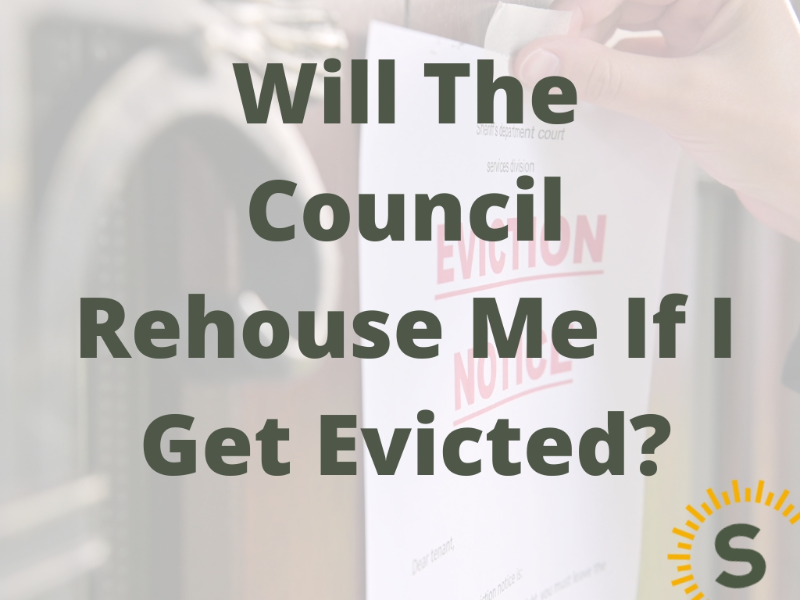
Eviction is a distressing and potentially life-altering experience. If you find yourself facing eviction, one of the most pressing concerns may be whether the council will provide you with alternative housing.
In this insight, we will explore the circumstances in which the council may rehouse individuals who have been evicted and provide valuable insights into the process.
We will also discuss the reasons why you may face eviction in the first place and offer potential solutions to mitigate the risk.
If you get evicted and are homeless, the council may not offer immediate housing, but will help you to secure alternative accommodation based on your situation. To access this support, initiate a homeless application with your local council.
Facing eviction can be an overwhelming and distressing experience. It is crucial to understand the reasons why eviction may occur and the potential consequences it may have on your housing situation.
If you are evicted or asked to leave a council house, several outcomes can occur depending on the circumstances:
The council may provide you with alternative accommodation, such as another council house or temporary housing, if you are eligible and have a genuine housing need.
If you are considered homeless after leaving a council house, the council has a duty to assess your situation and provide assistance. This might include offering temporary accommodation or helping you find suitable housing.
Councils typically cannot evict tenants without following a legal process, including giving proper notice and obtaining a possession order from a court. If you feel the eviction was unfair or illegal, you may have the right to challenge it.
You may have the option to appeal the council's decision or request a review if you disagree with their actions or believe you were unfairly evicted.
If you are not eligible for council housing or the council is unable to provide alternative accommodation, you may need to explore private rental options or housing associations.
It's essential to contact your local council and seek advice if you face eviction from a council house. They can provide specific guidance based on your situation and local housing policies.
There are various reasons why someone may face eviction. Some common reasons include:
It is important to note that eviction should always be a last resort for landlords, and they must follow legal procedures to carry out the eviction process.
Local authorities have a legal obligation to provide assistance and support to individuals who are homeless or at risk of homelessness.
Under the Housing Act 1996 and the Homelessness Reduction Act 2017, councils have a duty to prevent homelessness and provide suitable accommodation for those in need. This duty extends to individuals who have been evicted or are facing eviction.
It is important to note that the council's responsibility may vary depending on the circumstances, such as your eligibility, priority need, and local housing policies.
When you approach the council for assistance after being evicted, they will assess your eligibility based on several factors, including:
The council will conduct a thorough assessment to determine your eligibility and the level of support they are legally obligated to provide.
If you are facing eviction or have already been evicted, it is crucial to seek assistance from the council as soon as possible. Here are steps you can take to navigate the process effectively.
The first step is to contact your local council's housing department or homelessness team. They will provide guidance on the next steps to take and the information they require from you.
You can typically find the contact details for your local council on their website or by calling the general council helpline. Be prepared to provide details about your eviction, your current housing situation, and any relevant documents.
Councils prioritise rehousing based on the level of need and vulnerability. Families with children, pregnant women, individuals with disabilities, and those facing immediate harm or danger are often given priority.
Understanding the priority system will give you an idea of your chances of being rehoused quickly. However, it is important to note that the availability of suitable housing and local demand may impact the timeline for rehousing.
Yes, While waiting for permanent accommodation, the council may provide temporary housing options to ensure you have a safe place to stay.
In emergency situations, the council may offer emergency accommodation, such as hostels or bed and breakfasts. This type of accommodation is typically temporary and may not provide the same level of comfort and stability as permanent housing.
It is important to communicate your needs and any specific requirements to the council to ensure they provide suitable emergency accommodation.
When rehousing individuals who have been evicted, the council considers various housing options based on availability, eligibility, and individual circumstances.
Social housing, also known as council housing or housing association properties, is one option for rehousing individuals who have been evicted. These properties are typically rented at below-market rates and are managed by local authorities or registered social landlords.
The availability of social housing may vary depending on the demand and waiting lists in your local area. It is essential to discuss your eligibility and options with the council to understand the likelihood of being allocated social housing.
In some cases, the council may assist individuals in securing private rented accommodation. This option provides more flexibility and choice in terms of location and property type.
The council may provide financial assistance, such as a rent deposit or a rent guarantee scheme, to support individuals in accessing private rented accommodation. They may also work with local landlords to identify suitable properties for rehousing.
It is important to note that private rented accommodation may require additional financial commitments, such as a deposit and ongoing rent payments. The council can provide guidance on accessing financial assistance and managing these expenses.
Financial assistance can help alleviate the financial burden associated with eviction and rehousing. The council may offer:
These financial support services aim to provide stability and ensure that individuals have the means to secure suitable accommodation.
If you require legal assistance during the eviction process, you may be eligible for legal aid. Legal aid provides financial support to individuals who cannot afford legal representation.
Legal aid can help you understand your rights, challenge eviction proceedings, and navigate any legal complexities involved. Contact your local Citizens Advice Bureau or legal aid service for more information on eligibility and accessing legal aid.
Understanding your rights as a tenant is essential when facing eviction or seeking rehousing.
As a tenant, you have certain rights that protect you from unfair eviction and ensure the provision of suitable accommodation. These rights may include:
Familiarise yourself with your rights as a tenant to ensure that your landlord abides by the law and to protect yourself from unjust eviction.
Landlords also have responsibilities to their tenants, which include:
Knowing your landlord's responsibilities will help you assert your rights and hold them accountable for any breaches.
After eviction, it is essential to review your finances and create a realistic budget. Consider the following steps:
By creating a comprehensive financial plan, you can rebuild your financial security and work towards long-term housing stability.
The council can enforce relocation under specific conditions. Evictions occur due to breaches of tenancy agreements, requiring legal processes. Redevelopment or safety concerns may lead to compulsory purchase orders, necessitating a move. Legal procedures and notices must be followed, and individuals have rights to appeal or seek assistance.
In conclusion, facing eviction can be an incredibly challenging and stressful experience. However, it is important to remember that there are support systems in place to help you navigate this difficult time. By understanding your rights, seeking assistance from the council, and exploring all available options, you can increase your chances of being rehoused and rebuilding your life after eviction. Remember, you are not alone, and there are resources available to guide and support you throughout this process.

Stuart is an expert in Property, Money, Banking & Finance, having worked in retail and investment banking for 10+ years before founding Sunny Avenue. Stuart has spent his career studying finance. He holds qualifications in financial studies, mortgage advice & practice, banking operations, dealing & financial markets, derivatives, securities & investments.





Our website offers information about financial products such as investing, savings, equity release, mortgages, and insurance. None of the information on Sunny Avenue constitutes personal advice. Sunny Avenue does not offer any of these services directly and we only act as a directory service to connect you to the experts. If you require further information to proceed you will need to request advice, for example from the financial advisers listed. If you decide to invest, read the important investment notes provided first, decide how to proceed on your own basis, and remember that investments can go up and down in value, so you could get back less than you put in.
Think carefully before securing debts against your home. A mortgage is a loan secured on your home, which you could lose if you do not keep up your mortgage payments. Check that any mortgage will meet your needs if you want to move or sell your home or you want your family to inherit it. If you are in any doubt, seek independent advice.